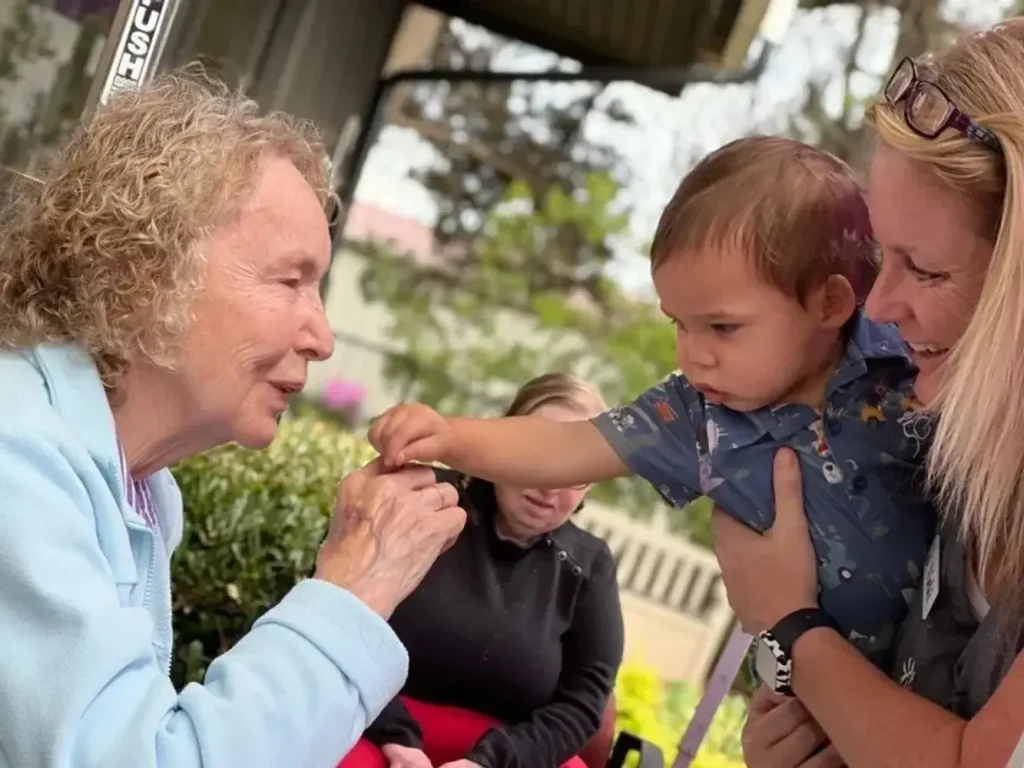
Child Care and Elderly Care: What Is Difference?
In your opinion, why child care and elder care are so different? Do you know the difference between a baby and an elderly nurse? Can I entrust my child to my parents’ nurse? Can someone who has a background in elderly care also care for children? Is it possible for a person to be a nurse for the elderly and a child at the same time? What factors make elderly care different from child care?
All these questions may arise for you who are looking for a child nanny. Today, many nursing centers have been set up that provide child, elderly and sick nursing services to families. Emotions will play the most important role in child and elderly nursing, but there are many differences between them. Caring for a child is a passion and a nanny usually enjoys taking care of them.
In nursing the elderly, the conditions are different. The geriatric nurses must deal with the complaints of the elderly, their pain and suffering at any time. In this article from the humanhealthmag we discuss the psychology of child care and elderly care. We want to show how care in both these groups should differ.
Biggest Challenges in Childcare
Children, especially in the early years of life, need a lot of care and attention. Since they are not able to take care of themselves until reaching puberty, they must be under the supervision of their elders and nurses. In fact, children cannot take care of themselves alone and need the help of others. Taking care of children is different from taking care of older adults in many ways. Although nursing a child may seem sweet and easy, it also has its challenges. The most important challenges are:
- Education
Child care includes education and training. For example, they should be taught how to maintain oral and dental hygiene and also learn safety against hazards.

- Nonverbal communication
One of the challenges that child nurses face is nonverbal communication with children. In order to form this relationship, the nurse must be very patient and careful in order to understand the child’s body language and emotions.
- Medical and pharmaceutical care
Children are growing. For this reason, not every type of medicine can be used to treat their diseases. This issue is also true for the foods that are given to the child. So, a child nurse should be very careful about the choice of medicines and foods for the child.
Major Challenges to Expect When Caring for The Elderly
How to care seniors at home? The elderly, like children, need special care. However, caring for the elderly has some differences from caring for children. This is due to physiological differences and symptoms of diseases that are more common in this age group. The characteristics and difficulties of Elderly Care compared to Childcare are related to the following factors:
- Oral and dental hygiene care
The elderly require special attention due to problems such as dry mouth or dental problems. The elderly should prevent infections and oral diseases by using specific methods to keep their mouth and teeth clean. They must be taught these methods.
- Use of care products
To improve the quality of life of the elderly, the use of skin softening creams, natural oils for body massage and appropriate products to maintain skin health can be useful. These products help the elderly to feel more comfortable and can also help improve the mood and self-confidence of the elderly.
- Daily activities
Some elderly people are less mobile due to diseases such as arthritis. In these cases, the part of daily activities is one of the parts that should be given special attention to the elderly. For example, suitable games, walking, swimming, climbing, etc. can help the elderly to maintain their health.
- Disability increases over time
Unlike children, who gain more abilities over time, the elderly, especially the group with progressive diseases, lose their motor abilities over time. The disease may cause the elderly to experience urinary and fecal incontinence. In this situation, the burden on their caregiver increases. This is also a difference between Child care and elderly care.

Elder Care vs. Child Care
Nursing care for both children and the elderly is a demanding and sensitive task that requires special expertise and attention. Not only are these two age groups physically and mentally very different, but the type of care and nursing methods must also be tailored to the specific needs of each. In following, we will examine the fundamental differences between child care and elderly care and explore key points that nurses need to know. Also remember that empower older adults plays a vital role in improving the quality of life of people in old age
- Common Diseases
Like adults, children suffer from diseases such as colds, flu, and sometimes infections such as respiratory tract infections. For this reason, it is very important to take care of their hygiene and control infections. As they age, many seniors face diseases such as arthritis, diabetes, high blood pressure, and cardiovascular disease. In addition, diseases such as Parkinson’s or dementia are also common in this age group. Therefore, caring for the elderly does not only mean providing the necessary drugs, but also requires the control and management of these diseases.
- Nutrition
Children should have proper nutrition for better growth and development. Foods containing nutrients such as protein, vitamins and carbohydrates are essential and should be included in children’s diets at regular intervals. In addition, paying attention to a balanced and healthy diet for children is a very important issue in child care.
On the other hand, the elderly should eat foods with the lowest amount of salt, fat and sugar and should pay attention to the consumption of foods containing protein and related nutrients. One of the most fundamental and important parts of caring for the elderly is paying attention to diet. Elderly people should use healthy and high nutritional value food. High-nutritional foods such as vegetables, fruits, proteins, and vitamin-rich sources should be included in the elderly’s diet.
- Different Lifestyles of Children and the Elderly
Children and the elderly generally have different lifestyles. Children, due to their growth and physical activities, require more nutritionally rich nutrition to provide the energy needed for their body and mind to grow. On the other hand, the elderly require more of a calm and sedentary lifestyle that includes light activities and ongoing medical care.
- Need for Care and Attention
Children and the elderly need special care and attention. However, the way of child care and elderly care is different. For example, children need more attention to their body, teeth and hair, and we need to pay attention to the amount of physical activity, the type of games they do, and how to deal with the spread of infectious diseases. In contrast, the elderly need more attention to issues such as skin and hair, chronic diseases and medical care.
- Different Feelings & Emotions
In both pediatric and geriatric nursing, emotions play an important and fundamental role, but they also have major differences. Child nursing is accompanied by enthusiasm and excitement. Usually, a child nurse and caregiver enjoy caring for a child, but in geriatric nursing, the situation is different! Geriatric nurses must cope with the mental turmoil of the elderly such aggression in the elderly, the pain and suffering of the elderly, and the specific behaviors of the elderly.
The fact that the elderly have taken care of their children for a lifetime and their children have to take care of them in their old age is very difficult and upsetting for the elderly. Having different emotions is one of the differences between caring for a child and the elderly.

- Management and Implementation of Care
Child care usually begins when the child is transferred home from the hospital and continues into adulthood. This care can be done at home or daycare. However, the circumstances of caring for the elderly are different. The elderly often live away from your home and in their own home, and due to their physical and mental conditions, they need a caregiver other than their children.
Elderly people like to live in their own home, if the elderly person’s house may not be suitable for their life in any way and the elderly person has to change the place.
- Power of Thinking and Arguments
Arguing with children is very different from arguing with the elderly, and this makes the job very difficult for the elderly nurse. As the elderly age, they usually become more stubborn and do not listen to what their caregiver says, while children’s caregivers do not have this problem. The best way for elderly caregivers in this situation is to seek help from experts in this field so that they can take better care of the elderly.
- Effect of Time on the Changing Conditions of Children and the Elderly
In pediatric nursing, a pediatric nurse can usually predict the child’s development, while this is much more difficult for geriatric nurses because the physical conditions of the elderly are changing. Over time, pediatric nurses witness the child’s progress, which is encouraging, but geriatric nurses are always observing the decline and deterioration of the elderly.
- Power and Authority
Throughout our lives, our parents have been telling us what to do, and we usually obey them! But in elder care, it is the children who are giving orders to their parents. This is a bit difficult for the elderly and may make them resent their children and their caregivers.
In other words, in old age, the elderly may resist the children’s orders, and this role change can be challenging. But don’t worry! By being kind and kind, this problem can be solved to some extent in the elderly so that they don’t feel like they are extra or a burden.
Concluding Remarks
By comparing child care and elderly care, we come to the conclusion that the abilities required for the two jobs are very different. In fact, it is impossible to entrust the nursing of the elderly and the child to one person. You cannot even get help from someone who has a background in elderly care to care for the child. A babysitter must have the necessary energy and creativity to play with him/her; while having physical strength and patience is more essential to care for the elderly.
Loved this article? Or do you have suggestions to make it even better? Please share your thoughts in the comments below, and let’s work together to build better content!

Frequently Asked Questions
What is the Main Difference Between Child Care and Elderly Care?
Childcare usually focuses on the daily needs and physical and emotional development of the child, while eldercare involves managing more complex issues such as health, medications, etc. In childcare, parents can anticipate when they will need help, but in eldercare, the situation can change suddenly and requires more flexibility.
How do Emotions Differ in Child Care and Elderly Care?
In childcare, parents are usually faced with positive experiences and visible improvements that create a sense of satisfaction. However, in eldercare, emotions may be more negative, as this experience is usually accompanied by a loss of independence and health. This can lead to emotional challenges for caregivers.
